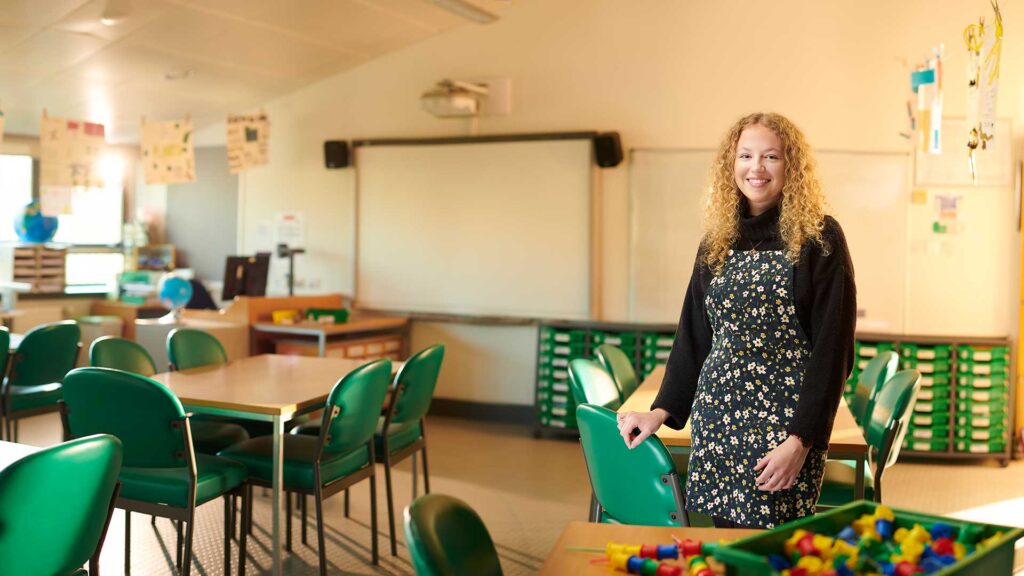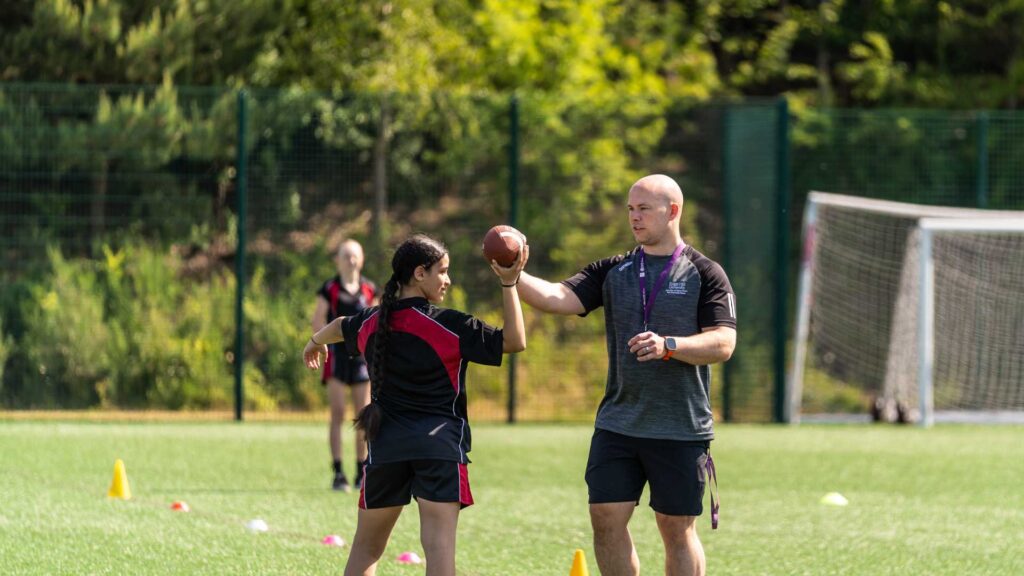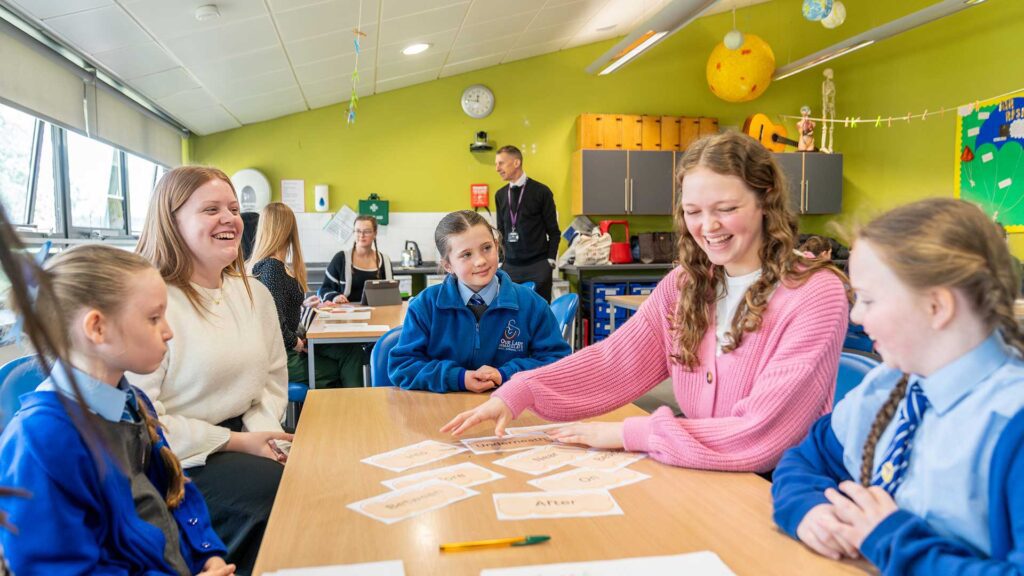Secondary Computing with QTS (11-16) PGCE
GOV.UK code: Q549
Inspire a digital generation. Build enthusiasm for IT. Train to teach computing to 11-16 year-olds, and help unlock their technical creativity. On completion of this course, you’ll gain recommendation for Qualified Teacher Status (QTS).
As a student on this course, you may be eligible for a bursary or scholarship. Postgraduate bursaries are tax-free payments you receive if you’re training to teach certain subjects. You do not need to apply for a bursary, you’ll automatically get one if you’re eligible.
Overview
| Course length: | 1 year full-time |
|---|---|
| Start dates: | September 2026 |
| Location: | Edge Hill University |
| Example offers: | 2:2 or above (or equivalent) in a relevant subject View full entry criteria |
| Subject(s): | Education and Teaching |
| Faculty: | Education |
| Department: | Secondary and Further Education |

Young people are growing up in a world where digital literacy is vital in all aspects of their lives. Starting to learn these skills at school is essential to set them up for success, whatever they decide to do in the future.
With a new focus on the subject in schools and a resurgent interest in computer technology like the Raspberry Pi and Codebug, there’s no better time to train as a teacher of computing. You’ll learn to teach all aspects of computing, from computer science and digital literacy to information technology. And you’ll get to use the latest specialist software and tools.
How do you create a lesson plan to inspire and motivate your pupils? What are the current challenges in secondary education? How do you pass on your computer science expertise – and continue to grow that knowledge throughout your career? You’ll explore a range of questions to help you become the best teacher you can be.
Learn to lead in the classroom
You’ll develop your reflective and analytical skills, as well as boosting your own subject knowledge. To prepare for teaching computing at key stage 3 and 4, you’ll also get lots of hands-on experience in the classroom.
During your placement, you’ll work alongside your computing tutor and school-based mentor. They’ll help you apply your university learning to your own teaching and be there for you whenever you need support.
Successful completion of the programme leads to a recommendation for Qualified Teacher Status (QTS).
If you have qualified teacher status (QTS), you’ll get a minimum starting salary of £32,916 (or more in London) as a primary or secondary school teacher in England, rising to £51,048 for more experienced teachers.
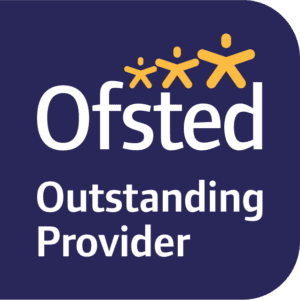 Ofsted Outstanding Provider
Ofsted Outstanding Provider
Course features
-
Ofsted outstanding provider for Initial Teacher Education
-
Professional accreditation
-
Professional practice placements
-
International students can apply
What you'll study
At the start of your course you will complete an audit of your subject knowledge. This way you can identify your areas of strength and those you need to develop.
You’ll study the computing curriculum, including software used in schools, educational theory, as well as innovative teaching and assessment methods. Discover how to plan a lesson effectively and how to incorporate lively, interactive techniques to help your students develop confidence and self-esteem.
You’ll also build on your subject knowledge in a range of areas, including programming, computational thinking, applications and database design. We’ll also cover multimedia, spreadsheet modelling, web authoring, desktop publishing and aspects of computer control.
To prepare for your future as a teacher, you’ll also learn about professional roles and responsibilities, as well as polishing your academic skills.
How you'll study
A combination of academic and technical study, group discussion and reflection, and practical, work-based learning in the classroom will give you all the knowledge and skills you need to become a creative and innovative teacher. The programme aims to develop a reflective and critically analytical approach to education.
School Placements
You will undertake extensive placements in schools, putting your training into practice through assisting in and taking responsibility for classes, and working alongside mentors and peers to further your professional development. The focus initially is on observation and supporting teaching and learning. Your teaching timetable will increase as your training progresses and you become more confident and competent in the classroom.
You will also engage in Intensive Training and Practice (ITAP)—a distinctive feature of our curriculum. These focused, high-impact sessions allow you to rehearse key elements of teaching such as behaviour management, scaffolding, questioning, and professional behaviours. ITAPs are grounded in the latest educational research and delivered by expert tutors, mentors, and partner schools.
During ITAP periods, your schedule may vary from the standard pattern, requiring you to attend sessions on campus or in school on different days. These experiences are designed to deepen your understanding and refine your teaching skills in key areas of classroom practice.
How do you decide which schools to place trainees in?
We carefully select placement schools that offer high-quality mentoring and a broad range of experiences. When allocating placements, we consider your subject specialism, prior experience, and personal circumstances, including commuting distance and accessibility. Our priority is ensuring supportive environments that enable you to thrive and make strong progress toward Qualified Teacher Status.
How much time will you spend in each school?
You will spend the majority of the PGCE year in schools, gaining experience across at least two contrasting settings. The exact pattern and duration of placements may vary each year, but you will have substantial time in classrooms to develop your teaching practice and experience a range of school contexts.
What will you do while in your placement schools?
During school placements, you will gradually develop from observing experienced teachers to leading your own lessons, with increasing independence. You will plan, teach, and assess learning within your subject area, reflecting on pupil progress and your own practice, through mentor feedback and professional discussions. You will also participate in departmental and whole-school activities, attend meetings, support extracurricular opportunities, and engage with pastoral responsibilities. Observing a range of colleagues will allow you to explore different teaching styles and subject-specific pedagogies. You will be supported by a trained subject mentor who provides weekly developmental targets and tailored guidance as you follow a structured weekly curriculum, underpinned by the ITTECF and Teachers’ Standards, ensuring coherent progression in subject knowledge, curriculum planning, behaviour management, inclusion, and assessment. Throughout placement, your university tutors will provide ongoing support, and lecturers continue to deliver curriculum content, ensuring seamless alignment between university-based and school-based training, with no separation between theory and practice.
What will you do during their theoretical training?
At Edge Hill University, theoretical training underpins classroom practice. You will engage with evidence-informed modules covering curriculum design, behaviour management, inclusion, assessment, adaptive teaching, literacy, and professional conduct. Subject-specific sessions deepen disciplinary knowledge and pedagogy, ensuring you understand how pupils learn within their subject. Core modules focus on evidence-informed practice in subject areas, curriculum design, and key learning principles, alongside adolescent development, safeguarding, SEND, and diversity. Subject specialist lectures and seminars encourage critical engagement with educational research and reflection on teaching approaches. You will also participate in academic research and debate, exploring current thinking, developments, and issues within your subject area to strengthen your professional understanding. You are guided to critically evaluate theory and apply it effectively in school contexts, drawing on recent scholarship and national frameworks such as the ITTECF. The taught curriculum continues seamlessly across both campus and placement periods, ensuring sustained progression and coherence between theory and practice.
How you'll be assessed
You will be assessed, through a balanced combination of coursework and portfolio assessments, against both academic criteria and the standards related to QTS. Various other tasks will enable you to show your competence in numeracy and literacy as well as computer science and information technology, including creating an interactive teaching pack and undertaking action-based research.
Your professional practice will conclude with a final viva that will allow you to demonstrate appropriate achievement against the Teachers’ Standards in order to allow us to make a recommendation for QTS.
Who will be teaching you
The Faculty of Education has been at the forefront of teacher education for over 135 years and today enjoys the enviable position of being one of the country’s leading providers of education, training and research for the children’s workforce.
The programme is managed and developed by a team of experienced tutors all of whom have experience of teaching in schools.
The Edge Hill lead mentors and mentor leadership team play an important part in your teacher training as experts in their field. They have a deep knowledge of the trainee curriculum and support trainees and mentors to make progress providing guidance and support on aspects of the curriculum and assessment.
Entry criteria
To join this PGCE, you will be expected to have:
- A degree equivalent to UK first-class or second-class honours (2:2 or above) in a relevant subject. Other subjects may be considered if you have a relevant A Level (or equivalent qualification) and a willingness to engage in subject knowledge enhancement, subject to availability.
- GCSE English Language or English Literature and GCSE Mathematics at Grade C or Grade 4 or above (or equivalent qualification)
- Satisfactory levels of Information and Communications Technology competence
- A commitment to, and understanding of, secondary education, demonstrating the personal attributes, values and motivation required to train as a teacher.
Please note, for the purposes of initial teacher training, level 2 literacy and numeracy qualifications are not considered as equivalent to GCSE Grade C or Grade 4 in English Language or English Literature and Mathematics.
An interview forms part of the selection process, which can be conducted online or face to face.
If you accept a formal offer from Edge Hill University you will be required to meet the Department for Education’s standards for physical and mental fitness to teach and clearance to work with children. Further information, including a Declaration of Health questionnaire and details of how to apply for a Disclosure and Barring Service (DBS) Enhanced Disclosure will be sent to you after you have firmly accepted an offer.
English language requirements
International students require IELTS 6.5, with a score no lower than 6.0 in each individual component, or an equivalent English language qualification.
If your current level of English is half a band, one band, or one-and-a-half bands lower, either overall or in one or two elements, you may want to consider our Pre-Sessional English course.
How to apply
Apply full-time
Read our guide to applying for PGCEs and Postgraduate Teacher Training to find out more about the application process.
Should you accept an offer of a place to study with us and formally enrol as a student, you will be subject to the provisions of the regulations, rules, codes, conditions and policies which apply to our students. These are available at www.edgehill.ac.uk/studentterms.
There’s plenty of opportunities to come take a look around campus. Attend one of our open days to see what life at Edge Hill University is all about.
Book an open day
Facilities
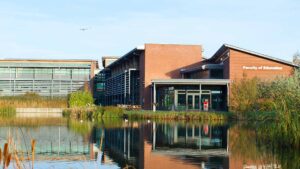 The Faculty of Education enjoys the enviable position of being one of the country’s leading providers of transformative education, training and research for the teaching and education workforce. Housed in a state-of-the-art £9m building, the Faculty of Education enjoys a stunning setting from both its lakeside and piazza buildings.
The Faculty of Education enjoys the enviable position of being one of the country’s leading providers of transformative education, training and research for the teaching and education workforce. Housed in a state-of-the-art £9m building, the Faculty of Education enjoys a stunning setting from both its lakeside and piazza buildings.
Facilities in the lakeside building include a 300-seat lecture theatre, five well-equipped ICT suites, and 18 teaching rooms complete with the latest technology.
Our nearby piazza building houses our Research Hub and our Secondary and Further Education department including a lecture theatre and a number of seminar rooms.
Where you'll study
Finance
Tuition fees
UK Full-Time
£9,535
for the course
International
£17,000
for the course
EU/EEA and Swiss students who have settled or pre-settled status under the EU Settlement Scheme, as well as Irish nationals, may be eligible for the UK tuition fee rate.
Financial support
Subject to eligibility, UK students joining this course can apply for a Tuition Fee Loan from the Government to cover the full cost of tuition fees. UK students enrolling on the course may also be eligible to apply for additional funding to help with living costs. If you are a UK student joining this PGCE in academic year 2025/26, you may be eligible to receive a Department for Education bursary worth £29,000 if you have a first class, 2:1 or 2:2 honours degree, or you have successfully completed a PhD or Masters award.
Please view the PGCE fees and funding guide for comprehensive information about the financial support available to eligible UK students.
Scholarships
We offer a range of scholarships, which celebrate the determination, commitment and achievement of our students. Many of our scholarships are awarded automatically. There are some however, where you will need to be involved in an application or nomination process. To find out more about our scholarships and check your eligibility, please visit our dedicated scholarships pages.Money Matters
Please view the relevant Money Matters guide for comprehensive information about the financial support available to eligible UK students.EU/EEA and Swiss students who have settled or pre-settled status under the EU Settlement Scheme may be eligible to apply for financial support. Irish nationals can ordinarily apply to Student Universal Support Ireland (SUSI). If you are an EU student who does not have settled or pre-settled status, or are an international student from a non-EU country, please see our international student finance pages.
Tuition fees
International
£18,000
a year
EU/EEA and Swiss students who have settled or pre-settled status under the EU Settlement Scheme, as well as Irish nationals, may be eligible for the UK tuition fee rate.
Your future career
This PGCE is accredited by the Department for Education. Successful completion of the programme will enable you to gain recommendation for Qualified Teacher Status (QTS).
You’ll be ready to progress into employment as an early career teacher of computer science at secondary school level. Our proactive careers service can help you to find job vacancies. They also offer in-depth advice on teacher job applications and interviews.
Your academic and professional experience will also mean you could progress onto MA or MRes study. After that, you might even decide to work towards your PhD.
Course changes
Every effort has been made to ensure the accuracy of this information, however our courses are subject to ongoing review and development. Changing circumstances may necessitate alteration to, or the cancellation of, courses.
Changes may be necessary to comply with the requirements of professional bodies, revisions to subject benchmarks statements, to keep courses updated and contemporary, or as a result of student feedback. We reserve the right to make variations if we consider such action to be necessary or in the best interests of students.



